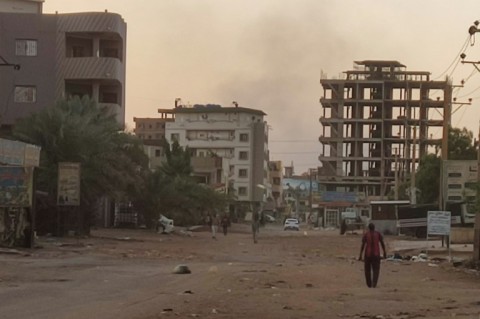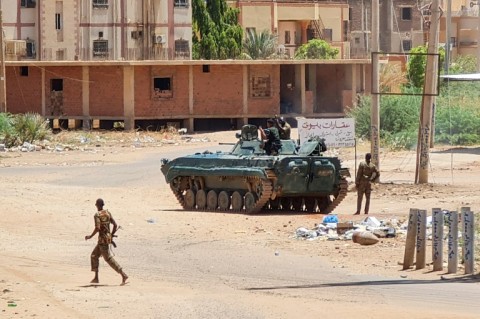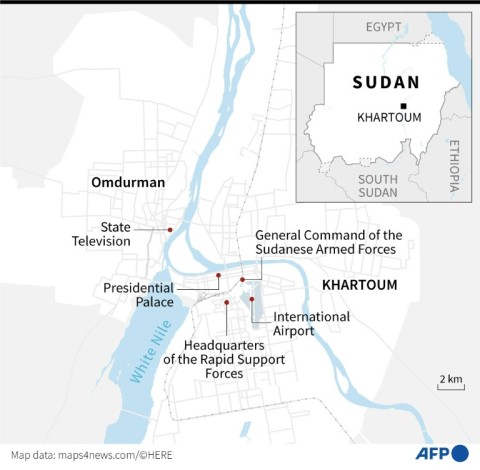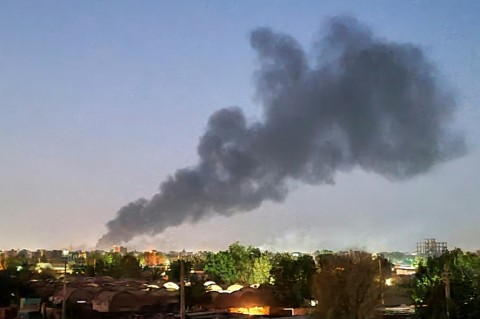
Like many Sudanese forced to flee their homes amid raging street battles, Mohamed said that when he finally returned to his flat, he found heavily armed paramilitaries had moved in.
After cautiously approaching his Khartoum apartment block, he discovered that "the entire building had become like a military barracks filled with weapons and ammunition".
Almost a month of heavy fighting has turned Khartoum into a war zone, with the city's five million residents enduring artillery barrages, gunfights, air strikes and anti-aircraft fire.
Many have hunkered down at home amid power outages and a lack of clean water, food and medicines -- but many have also been forcefully evicted.
The northern suburb where Mohamed lived has become a major battleground in the war between army chief Abdel Fattah al-Burhan and Mohamed Hamdan Daglo, commander of the paramilitary Rapid Support Forces (RSF).

After Mohamed's family had spent terrifying days at home, waking and sleeping to deafening explosions and gunfire outside, RSF fighters came to evict them.
"They knocked on the door and asked us to leave," said the 54-year-old, who like others interviewed by AFP for this article asked not to be identified by his full name citing security fears.
Before leaving home, Mohamed's family took what they could carry and locked their doors, he added.
When he returned days later to collect some belongings, Mohamed was interrogated by the RSF paramilitaries whom he had found sitting inside his apartment.
- Fighters 'in our kitchen' -
Witnesses in Khartoum say RSF fighters have often taken up positions in leafy residential streets, with soldiers hiding camouflaged trucks under trees.

Men in military fatigues patrol in pick-up trucks mounted with heavy machine guns.
Another man, Babiker, 44, said he fled his home in central Khartoum amid incessant gunfire, only to return two weeks later to find it occupied by the RSF.
"I found more than 20 paramilitaries living there," he said, adding he was interrogated for half an hour before being allowed entry.
"They were using all appliances and cooking in our kitchen," he said. "All the bedrooms that we had locked before leaving were open."
Sudan's bitter fighting has so far killed at least 750 people, wounded thousands and uprooted hundreds of thousands, with many refugees fleeing the country.

The UN's human rights commissioner, Volker Turk, said the RSF had allegedly taking "possession of many buildings in Khartoum to use as operational bases, evicting residents and launching attacks from densely populated urban areas".
He also criticised Sudan's military for launching "attacks in densely occupied civilian areas, including air strikes" that have killed residents.
The paramilitaries have also turned many hospitals and medical facilities into "barracks" -- a practice the UN World Health Organization has condemned as a "gross violation".
Even diplomatic missions in Khartoum have not been spared.
On May 3, Saudi Arabia said "an armed group" had stormed its cultural office and "damaged appliances, cameras, and seized some property".
The European Union said on April 17 that its ambassador was "assaulted" in his residence, labelling the attack a "gross violation of the Vienna Convention".
- 'All our memories' -
"Last Wednesday, the RSF took over my family house in Khartoum, where my cousins and I have our documents, valuables, and all our memories," one Sudanese woman wrote on Twitter.

"It's confirmed by the only neighbour left in the neighbourhood that it is the RSF. RSF soldiers are going out of control, out of Hemeti's control", she added, referring to General Daglo's nickname.
Another citizen, Tahany, 33, escaped her home when fighting intensified in the area near Khartoum's airport.

Having abandoned hopes for an end to the fighting, she decided to join the tens of thousands of Sudanese making the long, arduous trip to Egypt -- but she first needed to return home to get her travel documents.
"Paramilitaries at checkpoints interrogated us as we were trying to return to our neighbourhood, and every time we told them we wanted to pick up some things from our home," she said.
Eventually, Tahany and her mother were allowed entry to the home, escorted by paramilitaries.
"We found that all our home items had been used, from the kitchen to the beds," she said. "They even mounted a weapon on the balcony on the second floor."
Terrified, Tahany and her mother frantically searched for their travel documents and rushed out. "We are now on our way to Egypt," she said. "We don't know what has become of our home."

